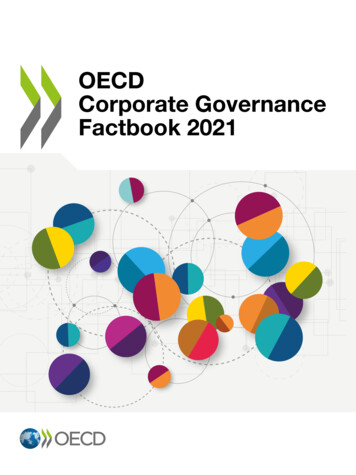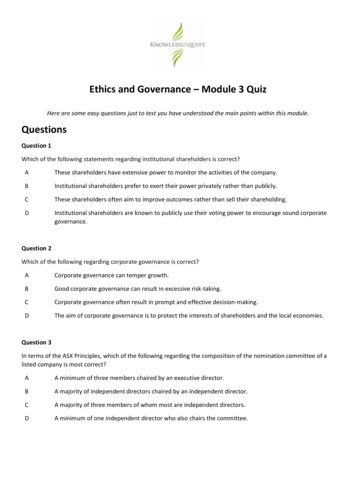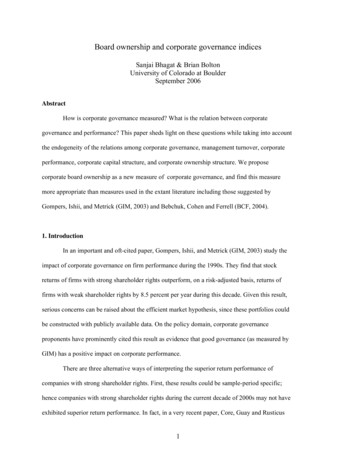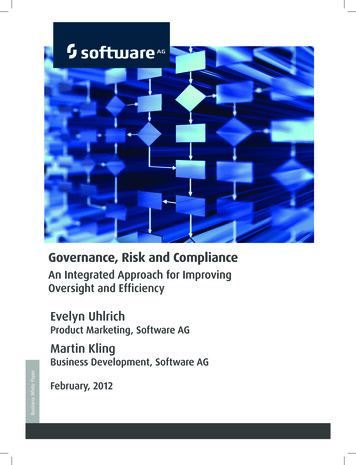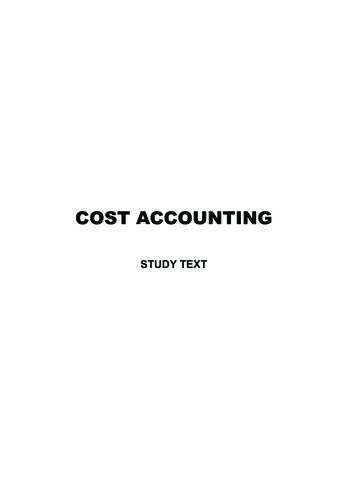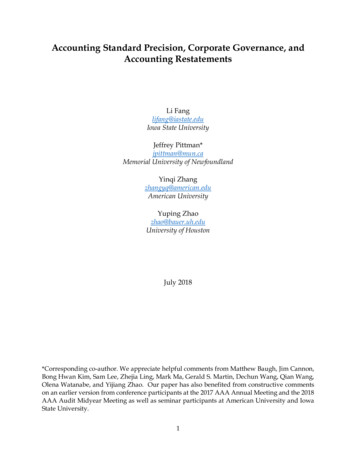
Transcription
Accounting Standard Precision, Corporate Governance, andAccounting RestatementsLi Fanglifang@iastate.eduIowa State UniversityJeffrey Pittman*jpittman@mun.caMemorial University of NewfoundlandYinqi Zhangzhangyq@american.eduAmerican UniversityYuping Zhaozhao@bauer.uh.eduUniversity of HoustonJuly 2018*Corresponding co-author. We appreciate helpful comments from Matthew Baugh, Jim Cannon,Bong Hwan Kim, Sam Lee, Zhejia Ling, Mark Ma, Gerald S. Martin, Dechun Wang, Qian Wang,Olena Watanabe, and Yijiang Zhao. Our paper has also benefited from constructive commentson an earlier version from conference participants at the 2017 AAA Annual Meeting and the 2018AAA Audit Midyear Meeting as well as seminar participants at American University and IowaState University.1
Accounting Standard Precision, Corporate Governance, and AccountingRestatementsAbstract: Prior research documents wide variation in the precision of accounting standards(rules-based standards (RBS) versus principles-based standards (PBS)). We examine whetherfinancial reporting quality evident in restatements is associated with accounting standardprecision and whether the role that non-regulatory monitors and the SEC as the regulator play inthe financial reporting process varies with accounting standard precision. Our strong, robustevidence implies that the likelihood of a subsequent financial report restatement decreases as theaccounting standards applicable to the firm become more principles-based. This inference isrobust to examining exogenous shifts in standard precision caused by accounting standardrevisions. Additional analyses suggest that our evidence mainly stems from managers’ concernsover second guessing rather than greater litigation risk. We also find that non-regulatorymonitors, including independent boards, audit committees, and external auditors, play a moreeffective role at constraining misreporting when they have the guidance of more detailed rulesunder RBS, whereas the SEC plays a more prominent role when there is a lack of clear guidanceunder PBS. Our large-sample empirical evidence suggests a potential trade-off between PBS andRBS: although the average reporting quality measured by misreporting may improve under themore principles-based framework, some of the corporate governance mechanisms carried out bynon-regulatory monitors may not function as well under more PBS as under more RBS,potentially reflecting that it is harder for non-regulatory monitors to enforce less preciseaccounting standards. Our results suggest that more intensive regulatory monitoring would beneeded to compensate for the potentially weakened monitoring by non-regulatory monitorsshould the U.S. financial reporting regime moves to a more principles-based framework.
I.IntroductionAccounting discretion significantly impacts financial reporting quality and theinteractions between managers and various monitors (Holthausen 1990; Fields, Lys, and Vincent2001; Nelson, Elliott, and Tarpley 2002). An important source of accounting discretion arises fromthe variation in the precision of accounting standards (Nelson 2003). In particular, principlesbased accounting standards (PBS) emphasize the importance of reflecting the underlyingeconomic substance of the transaction by allowing greater flexibility in the accounting treatment.In contrast, rules-based accounting standards (RBS) focus on strict compliance with specificaccounting rules by stipulating bright-line tests and detailed implementation guidance. Financialreporting quality is a joint product of accounting standards, management reporting quality, andaudit quality (Chen, Jiang, and Zhang 2014). In this study, we examine whether financialreporting quality is affected by the precision of accounting standards, and how accountingstandard attributes shape the effectiveness of various forms of monitoring of the financialreporting process.U.S. accounting standards are predominantly rules-based and have become even more soover time (Donelson, McInnis, and Mergenthaler 2016). RBS have been criticized as a primarydriver of restatements due to their excessive details and confusing bright line rules andexceptions. As a result, the Securities and Exchange Commission (SEC) has aimed at movingtowards PBS over the past decade (FASB 2002; SEC 2003, 2008, 2015; Plumlee and Yohn 2010).1Proponents of PBS contend that PBS reduces the complexity of standards (Section 108 of theSome recent accounting standard changes such as the new revenue recognition standard (ASU 2014-09)and lease standard (ASU 2016-02) reflect U.S. regulators’ intention to move towards principles-basedstandards. In her keynote address at the 2015 AICPA national conference, former SEC Chairwoman MaryJo White highlighted the possibility of allowing U.S. domestic companies to provide IFRS-basedinformation as a supplement to U.S. GAAP financial statements without requiring reconciliation (SEC 2015).11
Sarbanes-Oxley Act of 2002) and the discretion afforded by PBS allows managers to preparefinancial reports that more accurately reflect the underlying economics of the firm (Dye andSunder 2001; Folsom, Hribar, Mergenthaler, and Peterson 2017). However, proponents of RBSmaintain that detailed guidance and bright-line thresholds increase consistency in the accountingtreatment of similar transactions (Schipper 2003; Kothari, Ramanna, and Skinner 2010), relievepreparers of the burden of making sophisticated judgments over complex transactions (SEC2003), and narrow the scope for managerial opportunism.Since RBS clearly delineateunacceptable behavior and have a lower cost of dispute resolution (Ehrlich and Posner 1974),their compliance can be more amenable to auditing and enforcement (Donelson, McInnis, andMergenthaler 2012).We begin our analysis by examining whether accounting standard attributes shapefinancial reporting quality measured with financial report restatements.We focus onrestatements as they are a readily available signal of misreporting widely accepted by researchers,regulators, and investors (DeFond and Zhang 2014; PCAOB 2015; Christensen, Glover, Omer,and Marjorie 2016; Aobdia 2016; Karpoff, Koester, Lee, and Martin 2017). In analyzing 18,193firm-year observations during 2000-2009, we find that firms’ principles-based scores, which weoperationalize with the PSCORE developed by Folsom et al. (2017), are negatively associated withthe likelihood of subsequent financial report restatements, consistent with less financialmisreporting committed by firms subject to more PBS. 2 Furthermore, PBS is associated withlower frequency of both errors (unintentional mistakes) and irregularities (intentional mistakes).However, the negative association between PSCORE and restatements may not stem from higherThe PSCORE in Folsom et al. (2017) is constructed based on the rules-based score (RBC1) derived inMergenthaler (2011). Extensive prior research relying on the PSCORE or components of RBC1 includesDonelson et al. (2012; 2016) and Fang, Huang and Wang (2017).22
reporting quality of firms subject to more PBS since: (i) there may be more reporting of complextransactions at firms subject to more RBS; and (ii) it may be more difficult to detect violations ofPBS in the absence of detailed rules. Importantly, further analyses imply that these competingexplanations are not spuriously responsible for our core evidence.3Since the accounting standards applied by a firm are predominantly determined by itsindustry and the nature of its transactions, endogenous selection of accounting standardsunlikely constitutes a major threat to our conclusions. However, bias due to correlated omittedvariables in unobservable firm and industry characteristics may confound our inferences. Toaddress this concern, we exploit two exogenous accounting standard events: the shift from SFAS123 to the more principles-based SFAS 123r, and the shift from APB 17 to the more rules-basedSFAS 142. Reinforcing our earlier results, we find that the frequency of restatements due toviolations of these specific standards by firms affected by the standard shifts decreases (increases)as the accounting standards become more principles-based (rules-based).Prior research proposes that potential improvements in financial reporting quality undera principles-based regime may reflect higher litigation risk (Donelson, McInnis, andMergenthaler 2012) or greater concern over being second guessed when more accountingdiscretion is permissible (Agoglia, Doupnik, and Tsakumis 2011; Gimbar, Hansen, and Ozlanski2016).4,5 We find that the main results are more pronounced when there are strong concerns overbeing second guessed, --- i.e., in the presence of financial distress and high policy uncertaintyLater in the paper, we more fully motivate these analyses and outline the results.Consistent prior literature, we define second guessing as the uncertainty surrounding the risk of beingperceived as out of compliance (Agoglia, Doupnik, and Tsakumis 2011), or being evaluated more harshly(Kadous and Mercer 2016) by auditors or regulators.5 Another potential explanation is that the auditor demands more extensive evidence when the firm is moresubject to PBS (Cohen, Krishnamoorthy, Peytcheva, and Wright 2013; Peytcheva, Wright, and Majoor 2014).However, Donelson, Folsom, McInnis, Mergenthaler, and Peterson (2017) document lower audit fees forfirms more subject to PBS, inconsistent with the lower misreporting of these firms is driven by greater auditeffort.343
when the manager’s decisions are more likely to be challenged; and when the manager exhibitsless confidence. However, we find no evidence that financial reporting quality improves for firmsmore subject to PBS when the litigation risk is greater. Collectively, the evidence implies thatconcerns over second guessing are primarily responsible for the main results.Prior research documents that non-regulatory monitors such as independent boards, theaudit committee, and external auditors, as well as the regulator – the SEC are importantgatekeepers responsible for protecting financial reporting veracity. To the extent that thesemonitors heavily rely on accounting standards to interpret financial reports and to enforcecompliance with GAAP, it is important to analyze whether their roles vary with the precision ofaccounting standards. We find that board and audit committee independence and the externalauditor are more effective in constraining misreporting under the more RBS than under the morePBS, potentially reflecting that it is harder for these non-regulatory monitors to enforce lessprecise accounting standards.6 In contrast, the deterrence effect of SEC enforcement is strongerunder the more PBS than under the more RBS. The evidence collectively suggests that monitoringmechanisms documented in prior studies do not work equally effectively under PBS and RBS.Specifically, non-regulatory monitors are potentially more effective at disciplining the managerwhen they can rely upon clearly articulated detailed rules, whereas the SEC plays a moreprominent role when accounting standards are relatively vague, consistent with the SEC’scomplete independence from firm managers, its greater focuses on fulfilling the spirit of theAhmed, Neel and Wang (2013) find similar evidence on the interplay between accounting standards andenforcement in an international setting. They find that accounting quality decreases after the mandatoryadoption of IFRS, mainly in strong enforcement countries. They ascribe the finding to the fact thataccounting standards are more relevant for strong enforcement countries than for weak enforcementcounties. In strong enforcement countries, it is more difficult to enforce principles-based accountingstandards under IFRS which is looser than the domestic GAAP. In weak enforcement countries, accountingstandards precision is inconsequential.64
standards, as well as its superior authority to interpret accounting standards when less detailedguidance is available.We contribute to extant research in several ways. First, accounting standard settinginvolves a trade-off between the two qualitative characteristics of financial reporting: relevanceand faithful representation (FASB 2010). 7 This question is important given that the financialreporting quality implications of an accounting standard system is at the center of the debate overa potential shift to a more PBS regime (SEC 2003; SEC 2012). Folsom et al. (2017) primarilyexamine the impact of PBS on the relevance of financial reports to the decision usefulness ofinvestors. 8 We extend Folsom et al. (2017) by studying how PBS shape the representationalfaithfulness of financial reporting. We focus on reporting aggressiveness that amounts to GAAPviolations, which are a major concern to investors and regulators in the potential move to aprinciples-based regime (SEC 2003; 2012; PCAOB 2015; Christensen et al. 2016). We complementextant research by providing large-sample empirical evidence that, despite their greater latitudeand judgment, managers at firms subject to more PBS, on average, are less likely to misreport.The fact that PBS is associated with both fewer errors and fewer irregularities suggests less noiseand bias in financial reporting under PBS. Our results provide support to SEC’s move towardsconvergence with IFRS, which is considered more principles-based than U.S. GAAP. Further, weRelevance primarily relates to whether financial information is capable of making a difference to userdecisions (FASB 2010, QC6), whereas faithful representation focuses on whether financial information iscomplete, neutral, and free from error (FASB 2010, QC12).8 Although Folsom et al. (2017, Table 8) find that incentives to manipulate earnings further increaseearnings management under more PBS, they do not compare the tendency of earnings managementbetween firms more subject to PBS and firms more subject to RBS in absence of salient earningsmanagement incentives. Such a comparison potentially interests investors and regulators who areconcerned about the implications of PBS for the average firms. We extend Folsom et al. (2017) by testingthe change in the average restatement frequency and earnings management as firms become more subjectto PBS, unconditional on management incentives.75
find that concerns over being second guessed, rather than litigation risk, is the primary driverbehind the higher reporting quality under the more PBS.Second, despite extensive prior evidence on the role that internal and external governancemechanisms play in constraining managerial reporting opportunism, the channels through whichthese monitoring mechanisms work remain largely unexplored. Our evidence implies that nonregulatory monitors such as boards and auditors play a more effective role in curbing financialmisreporting under RBS. These results suggest that external auditors and board members likelyfulfill their monitoring obligations mainly through ensuring better compliance with detailedstandards when the applicable standards are more precise, rather than through more narrowlylimiting managerial discretion when the standards are less precise. In contrast, the SEC detersmore misreporting under PBS. 9 Although it would be difficult to justify proposing policyprescriptions at this early stage, our evidence highlights a potential trade-off between PBS andRBS: although the average reporting quality measured by misreporting frequency improvesunder the more principles-based framework, some monitoring structures may not perform aswell should the U.S. converge toward a more principles-based regime. The lower effectivenessof the board and external auditors could be a concern for investors and regulators.Our study is subject to two caveats. First, despite that Folsom et al. (2017) performextensive tests to validate PSCORE and to confront the concern that it also reflects transactioncomplexity, as well as our robust evidence from analyzing exogenous shifts in accountingstandards, we cannot completely dismiss the possibility that our results are spuriously driven byOur findings extend Agoglia et al. (2011)’s experimental evidence that monitoring by the audit committeeis more effective under RBS in at least three ways. First, besides audit committee, we also examine abroader set of monitors with potentially different expertise and incentives, including the external auditor,the board, and the SEC. Second, while Agoglia et al. (2011) operationalize reporting aggressiveness by thewithin-GAAP treatment of lease classification, we study GAAP violations, which capture more aggressivereporting practices. Third, we contrast how monitoring effectiveness varies with the accounting standardprecision for non-regulatory monitors and for the SEC.96
complexity. Second, as restatements are the result of a complex detection and negotiation processthat involves executives, auditors, boards, and sometimes regulators, in the presence of amisstatement, a restatement could be more likely under RBS which involve bright lines andspecific guidance. Although our findings hold to discretionary accruals as an alternative measureand we do not find evidence supporting harder detection of misstatements under PBS, we cannotentirely rule out the possibility that our results may reflect detection of misreporting and do notdirectly speak to occurrence of misreporting in the first place.The rest of the paper proceeds as follows. Section II reviews prior research. Section IIIdevelops the testable predictions. Sections IV and V outline the empirical strategy, data, andresults. Section VI concludes.II.Prior LiteratureAlthough there is a large body of research focusing on how the adoption of more PBS,such as IFRS, impacts the financial reporting properties of international firms (George, Li, andShivakumar 2016), prior empirical research seldom analyzes how the relative orientation ofprinciples- versus rules-based accounting standards influences U.S. firms, which operate in theworld’s strictest regulatory enforcement and litigation environment. Folsom et al. (2017) find that,earnings informativeness, earnings persistence, and earnings’ predictive ability for future cashflows increase as a firm relies more on PBS, consistent with PBS allowing managers to bettercommunicate the fundamental economics about the firm, although they also documentopportunistic managerial behavior in the presence of strong reporting incentives under PBS.Relatedly, Mergenthaler (2011) finds that firms relying more on RBS engage in a greatermagnitude of earnings management, although they are less likely to be penalized by the SEC inthe form of enforcement actions. We complement these two studies by examining: (i) whether onaverage PBS are associated with greater probability of misreporting; (ii) the drivers behind the7
potentially different frequency of GAAP violations between PBS and RBS; and (iii) howeffectively various governance mechanisms function under PBS relative to RBS.Prior theoretical and experimental research on the impact of accounting standardprecision on financial misreporting provides mixed results. In modelling accounting standardtightness and earnings management, Ewert and Wagenhofer (2005) predict that earnings qualityincreases with tighter standards, although the costs may outweigh the benefits. However,experimental evidence implies that managers report more aggressively under a more rules-basedregime (Psaros and Trotman 2004; Agoglia et al. 2011), or that standard precision is irrelevant tomanager reporting behavior (Hoffman and Patton 2002).Prior experimental and survey research on the importance of accounting standards tocorporate monitoring activities mainly focuses on the interaction between the manager andauditor. Nelson et al. (2002) find that managers are more likely to attempt earnings management,and auditors are less likely to adjust earnings management attempts, which are structured (notstructured) with respect to precise (imprecise) standards. Drawing on the example of leaseaccounting standards, prior research finds that auditors are more likely to intervene in clients’off-balance treatment of lease liabilities under PBS than under RBS (Cohen et al. 2013), partiallybecause under PBS jurors perceive that auditors have more control over financial reportingoutcomes, and are more likely to hold them liable for audit quality (Gimbar et al. 2016). Thisgreater process accountability under PBS increases the auditor’s demand for audit evidence(Peytcheva et al. 2014). In experimental research, Agoglia et al. (2011) is the only study to examinethe interaction with the manager by monitors other than the auditor. They report that a strongaudit committee constrains managers’ aggressive reporting under the more precise accountingstandards, although it has no perceptible impact under the less precise accounting standards.8
Although prior research provides useful insights on how accounting standard precisionaffects manager and auditor behavior, the results are mixed, are generated mostly based on leaseaccounting standards, and offer little evidence on the net impact on financial reporting quality.We extend this research by providing large sample archival evidence on how accountingstandard attributes affect the role that various internal and external monitors play at constrainingfinancial misreporting.III.Hypotheses DevelopmentThe Association between Accounting Standard Precision and RestatementsA primary distinction between PBS and RBS is the extent of professional judgment ordiscretion allowed within the system (Schipper 2003; SEC 2003). 10 On one hand, althoughmanagers enjoy more discretion under PBS to communicate the economic nature of thetransactions, they are held more accountable for the added discretion. Prior studies find jurorsmay perceive that managers face fewer constraints and have more control over the application ofimprecise accounting standards, leading to more negligence verdicts (Gimbar et al. 2016).Accordingly, concerns surrounding being second guessed or litigation risk exert a chilling effectevident in managers becoming more eager to report truthfully under the more uncertain PBS. Onthe other hand, since RBS prescribe exact rules to follow and provide clear thresholds foracceptable treatments, they require less expertise of accounting professionals (Schipper 2003) andmay constrain some mistakes in the first place. Consistent with this perspective, companiesattribute judgment in applying standards as one of the key causes of restatements (Plumlee andYohn 2010). Moreover, auditors are in a better position to resist client pressure when proposingRBS “minimize (and indeed, in certain instances, trivialize) the judgmental component of accountingpractice through the establishment of complicated, finely articulated rules that attempt to foresee allpossible application changes” (SEC 2003: 14).109
adjustments when they can rely on precise rules (Nelson 2003) and thus more mistakes could becorrected by auditors during annual audits.11 The net effect of the greater discretion under PBSon reporting quality is ambiguous.A second distinction between PBS and RBS is the complexity of standards. RBS is featuredwith great volume of implementation guidance and high level of details, which are alleged to addcomplexity in applying standards (SEC 2003). Peterson (2012) argues that greater complexitycauses more mistakes in preparing financial statements, and incentivizes managers to manipulateas complexity increases the costs to detect manipulation. He finds that both intentional andunintentional mistakes increase with the complexity of a company’s revenue recognition policy.Accordingly, there could be more misreporting under RBS due to its greater complexity.Taken as a whole, it is unclear ex ante whether more precise accounting standards areassociated with a greater likelihood of accounting misstatements, leading to our first prediction(both hypotheses are stated in null form):H1: The likelihood of accounting restatements is not associated with the extent to which a firm issubject to PBS.Does the Monitoring Role of Governance Mechanisms Vary with Accounting StandardPrecision?Shareholders rely on various economic agents to monitor managers to ensure that theybehave in the best interests of shareholders, including by truthfully reporting the results ofoperations (Jensen and Meckling 1976). Prior evidence implies that independent board and auditcommittee members (Abbott, Parker, and Peters 2004; Zhao and Chen 2008; Beasley, Carcello,In contrast, clients under PBS can argue, “tell me where it says I can’t do what I want” (Niemeier 2008:5), making it harder for auditors to challenge clients’ preferred reporting treatment or demand correctionsof management bias when auditors disagree with their clients. Corroborating the weakened auditornegotiation power under PBS, prior research implies that the auditor is more likely to waive materialadjusting journal entries when the issues involve more judgment (Wright and Wright 1997; Braun 2001).1110
Hermanson, and Neal 2010; Carcello, Hermanson, and Ye 2011), audit effort (Blankley, Hurtt, andMacGregor 2012; Lobo and Zhao 2013), industry specialist auditors (Carcello and Nagy 2004;Jayaramanl and Milbourn 2015), and the SEC (Kedia and Rajgopal 2011) play major roles inprotecting financial reporting integrity. However, extant research seldom examines how thesemonitoring agents constrain managers’ reporting discretion.We posit that two channels are at work. First, stronger monitoring exerts pressure onmanagers to more strictly follow specific accounting rules. This channel emphasizes GAAPcompliance and is more relevant for the more RBS. Second, tougher monitoring also morenarrowly restricts managerial discretion allowed by the standard, minimizes potential bias inmanagement judgment, and enforces faithful representation that reflects not only the legal form,but also the economic substance of the transaction. This channel stresses fair presentation and ismore pertinent to the more PBS. Both rule compliance and faithful representation are importantcharacteristics for high quality financial reporting and auditing (DeFond and Zhang 2014). Thus,the precision of accounting standards may not affect the incentives or effectiveness of monitors.However, for several reasons, monitoring by auditors and the board under the more rulesbased regime could be more effective than monitoring under the more principles-based regime.First, authoritative detailed accounting rules prescribe unacceptable accounting practices andtheir compliance is more amenable to audit. Detailed rules also strengthen the negotiation powerof the auditor and independent board members in requiring managers to book audit adjustments.Second, in the event of litigation, the auditor and board members may have even a weakerdefense against the allegation of financial reporting failure when the firm violates the clearguidance under a rules-based standard (i.e. Donelson et al.’s (2012) “roadmap” theory). As aresult, RBS heighten the incentives for the auditor and board members to enforce strictcompliance with standards. Third, anecdotal evidence suggest rules-oriented auditors are pretty11
common in the U.S. (Jamal and Tan 2010) and the Public Company Accounting Oversight Board(PCAOB) indicated “lack of professional skepticism” is one contributing factor for auditdeficiencies in areas that require greater judgment (PCAOB 2012, p. 5). The compliance mentalityof auditors could jeopardize audit quality under PBS. In contrast, the SEC always stressesfulfilling the intent of the accounting standard (SEC 2003). 12 Importantly, as the ultimateregulator of financial reporting, the SEC has much stronger negotiation power over the publicissuers than auditors do. Moreover, attorneys account for the majority of SEC staff.13 Attorneysare less likely to be subject to the “check-box” mentality than accountants due to their trainingand legal practice and they may find PSB are easier to understand and work with than RBS. Asa result, it is possible that SEC monitoring may more be effective under PBS. Grounded in priorresearch, our second hypothesis reflects whether accounting standard precision affects themonitoring role of various economic agents.14H2: The association between the likelihood of accounting restatements and board and auditcommittee strength, audit quality, and SEC monitoring does not vary with the extent to which afirm is subject to PBS.The SEC has repeatedly stressed the importance of reflecting the substance of transactions to protectinvestors. In his speech addressed to the American Accounting Association in 1985, SEC past ChiefAccountant, Clarence Sampson indicated “the role of judgment in financial accounting must be todetermine the real substance of transactions and to choose the appropriate standards to present thosetransactions in the financial statements in a way that is fair (‘representationally faithful’)”, available on.pdf. In her remark to Financial AccountingFoundation Trustees in 2014, the SEC current chairwoman Mary Jo White noted “financial reporting canand should provide investors with a clear picture of a company’s financial condition”, available jw.13In 2017, the SEC professional staff comprises of about 1,935 attorneys and 910 ecurities-and-exchange-commission).14 In their lease classification experiment, Agoglia et al. (2011) report that a strong audit committee inhibitsmanagers’ aggressive reporting under the more precise accounting standards, but has no effect under theless precise accounting standards. They interpret the results as reflecting managers’ desire to report moretruthfully under the less precise accounting standards lessens the burden on the audit comm
Accounting Standard Precision, Corporate Governance, and Accounting Restatements Li Fang lifang@iastate.edu Iowa State University Jeffrey Pittman* jpittman@mun.ca Memorial University of Newfoundland Yinqi Zhang zhangyq@american.edu American University Yuping Zhao zhao@bauer.uh.edu University of Houston July 2018 *Corresponding co-author.

